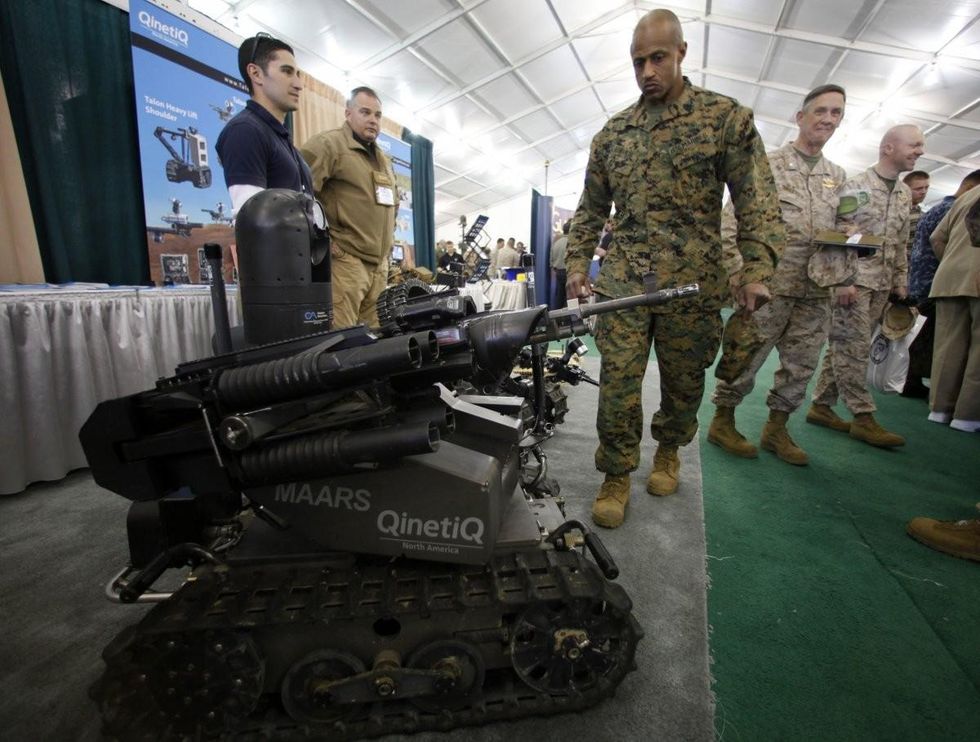'Mechanical Slaughter' Likely If No Ban on Killer Robots, UN Official Warns
Rapporteur calls for worldwide moratorium on lethal autonomous weapons

"War without reflection is mechanical slaughter," said Christof Heyns, the UN's special rapporteur on extrajudicial, summary or arbitrary executions, warning that the likelihood of LARS committing human rights violations go far beyond even the highly criticized drone, a technology that is remote controlled by humans.
LARs, Henys said, make lethal decisions in combat on their own using an "on-board" computer--void of all human compassion as well as accountability.
"Humans can, based on their understanding of the bigger picture, know that a more lenient approach is called for in a specific situation, for instance, when a soldier is surrendering," he noted.
"A decision to allow machines to be deployed to kill human beings worldwide -- whatever weapons they use -- deserves a collective pause," Heyns said, citing a new report he and his team released this month.
Heyns said that although fully autonomous weapons are not yet used in combat, countries such as the U.S. are already developing the technology--it is only a matter of time before they are implemented.
Heyns cautioned that using robots will make it easier for states to go to war and could also potentially be used by "repressive governments" to "suppress internal domestic opponents."
The United States, Britain, Israel and South Korea already use technologies that are seen as precursors to fully autonomous systems, the New York Times reports.
Heyns said this is especially problematic because no system of accountability for robots has been devised, rendering LARS essentially immune to national and international law.
"Human rights requires that human beings should in one way or another retain meaningful control over weapons of war," Heyns told the council.
Nations should "declare and implement national moratoria on the production, assembly, transfer, acquisition, deployment and use of LARs until a framework on the future of LARs has been established."
He also called for the "establishment of a high-level panel on LARs to articulate a policy for the international community on the issue."
Human Rights Watch, which has been actively campaigning on the issue, welcomed Heyn's words. The organization's director Steve Goose told journalists in Geneva this week:
The UN report makes it abundantly clear that we need to put the brakes on fully autonomous weapons, or civilians will pay the price in the future.
The US and every other country should endorse and carry out the UN call to stop any plans for killer robots in their tracks.
It is possible to halt the slide toward full autonomy in weaponry before moral and legal boundaries are crossed, but only if we start to draw the line now.
_______________________
An Urgent Message From Our Co-Founder
Dear Common Dreams reader, The U.S. is on a fast track to authoritarianism like nothing I've ever seen. Meanwhile, corporate news outlets are utterly capitulating to Trump, twisting their coverage to avoid drawing his ire while lining up to stuff cash in his pockets. That's why I believe that Common Dreams is doing the best and most consequential reporting that we've ever done. Our small but mighty team is a progressive reporting powerhouse, covering the news every day that the corporate media never will. Our mission has always been simple: To inform. To inspire. And to ignite change for the common good. Now here's the key piece that I want all our readers to understand: None of this would be possible without your financial support. That's not just some fundraising cliche. It's the absolute and literal truth. We don't accept corporate advertising and never will. We don't have a paywall because we don't think people should be blocked from critical news based on their ability to pay. Everything we do is funded by the donations of readers like you. Will you donate now to help power the nonprofit, independent reporting of Common Dreams? Thank you for being a vital member of our community. Together, we can keep independent journalism alive when it’s needed most. - Craig Brown, Co-founder |
Jacob Chamberlain is a former staff writer for Common Dreams. He is the author of Migrant Justice in the Age of Removal. His website is www.jacobpchamberlain.com.

"War without reflection is mechanical slaughter," said Christof Heyns, the UN's special rapporteur on extrajudicial, summary or arbitrary executions, warning that the likelihood of LARS committing human rights violations go far beyond even the highly criticized drone, a technology that is remote controlled by humans.
LARs, Henys said, make lethal decisions in combat on their own using an "on-board" computer--void of all human compassion as well as accountability.
"Humans can, based on their understanding of the bigger picture, know that a more lenient approach is called for in a specific situation, for instance, when a soldier is surrendering," he noted.
"A decision to allow machines to be deployed to kill human beings worldwide -- whatever weapons they use -- deserves a collective pause," Heyns said, citing a new report he and his team released this month.
Heyns said that although fully autonomous weapons are not yet used in combat, countries such as the U.S. are already developing the technology--it is only a matter of time before they are implemented.
Heyns cautioned that using robots will make it easier for states to go to war and could also potentially be used by "repressive governments" to "suppress internal domestic opponents."
The United States, Britain, Israel and South Korea already use technologies that are seen as precursors to fully autonomous systems, the New York Times reports.
Heyns said this is especially problematic because no system of accountability for robots has been devised, rendering LARS essentially immune to national and international law.
"Human rights requires that human beings should in one way or another retain meaningful control over weapons of war," Heyns told the council.
Nations should "declare and implement national moratoria on the production, assembly, transfer, acquisition, deployment and use of LARs until a framework on the future of LARs has been established."
He also called for the "establishment of a high-level panel on LARs to articulate a policy for the international community on the issue."
Human Rights Watch, which has been actively campaigning on the issue, welcomed Heyn's words. The organization's director Steve Goose told journalists in Geneva this week:
The UN report makes it abundantly clear that we need to put the brakes on fully autonomous weapons, or civilians will pay the price in the future.
The US and every other country should endorse and carry out the UN call to stop any plans for killer robots in their tracks.
It is possible to halt the slide toward full autonomy in weaponry before moral and legal boundaries are crossed, but only if we start to draw the line now.
_______________________
Jacob Chamberlain is a former staff writer for Common Dreams. He is the author of Migrant Justice in the Age of Removal. His website is www.jacobpchamberlain.com.

"War without reflection is mechanical slaughter," said Christof Heyns, the UN's special rapporteur on extrajudicial, summary or arbitrary executions, warning that the likelihood of LARS committing human rights violations go far beyond even the highly criticized drone, a technology that is remote controlled by humans.
LARs, Henys said, make lethal decisions in combat on their own using an "on-board" computer--void of all human compassion as well as accountability.
"Humans can, based on their understanding of the bigger picture, know that a more lenient approach is called for in a specific situation, for instance, when a soldier is surrendering," he noted.
"A decision to allow machines to be deployed to kill human beings worldwide -- whatever weapons they use -- deserves a collective pause," Heyns said, citing a new report he and his team released this month.
Heyns said that although fully autonomous weapons are not yet used in combat, countries such as the U.S. are already developing the technology--it is only a matter of time before they are implemented.
Heyns cautioned that using robots will make it easier for states to go to war and could also potentially be used by "repressive governments" to "suppress internal domestic opponents."
The United States, Britain, Israel and South Korea already use technologies that are seen as precursors to fully autonomous systems, the New York Times reports.
Heyns said this is especially problematic because no system of accountability for robots has been devised, rendering LARS essentially immune to national and international law.
"Human rights requires that human beings should in one way or another retain meaningful control over weapons of war," Heyns told the council.
Nations should "declare and implement national moratoria on the production, assembly, transfer, acquisition, deployment and use of LARs until a framework on the future of LARs has been established."
He also called for the "establishment of a high-level panel on LARs to articulate a policy for the international community on the issue."
Human Rights Watch, which has been actively campaigning on the issue, welcomed Heyn's words. The organization's director Steve Goose told journalists in Geneva this week:
The UN report makes it abundantly clear that we need to put the brakes on fully autonomous weapons, or civilians will pay the price in the future.
The US and every other country should endorse and carry out the UN call to stop any plans for killer robots in their tracks.
It is possible to halt the slide toward full autonomy in weaponry before moral and legal boundaries are crossed, but only if we start to draw the line now.
_______________________

